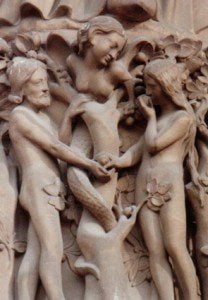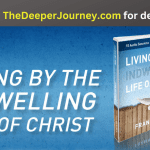 NPR had a story on Morning Edition this last Tuesday entitled Evangelicals Question The Existence Of Adam And Eve. You can download, listen, read a transcript of read the story at the link. The short piece – 7:44 – involves commentary and snippets of interviews with a number of people, many of whom have come up in various posts on the blog as we’ve looked at the question of Adam.
NPR had a story on Morning Edition this last Tuesday entitled Evangelicals Question The Existence Of Adam And Eve. You can download, listen, read a transcript of read the story at the link. The short piece – 7:44 – involves commentary and snippets of interviews with a number of people, many of whom have come up in various posts on the blog as we’ve looked at the question of Adam.
Among those questioning the historicity of Adam and Eve are John Schneider, until recently a professor of Religion at Calvin College (he took early retirement in the wake of the controversy surrounding his article in PSCF). Dennis Venema, an associate professor of Biology at Trinity Western University in British Columbia who posts regularly at BioLogos, Karl Giberson, and Daniel Harlow, a professor of Religion at Calvin College and author of another controversial article in PSCF (discussed here in two posts: 1, 2).
Albert Mohler, President of Southern Baptist Theological Seminary and Fazale Rana, vice president of Reasons To Believe, Ph.D. in Biochemistry, provide the counterpoint defending the traditional understanding of Adam and Eve as essential to the Christian faith.
The NPR story is fairly predictable. It emphasizes two widely separated extremes in evangelical thinking, but doesn’t have the time to really dig into the complexities of the discussions or the range of possible views. This is interesting, but not particularly informative. In the post today I don’t want to focus on the question of Adam – instead I would rather pose a related question for discussion.
Why do so many Christian scholars stick their neck out on this issue?
What is the motivation?
The end of the NPR story is what really caught my attention – and it is the aspect that I would like to highlight.
This debate over a historical Adam and Eve is not just another heady squabble. It’s ripping apart the evangelical intelligentsia.
“Evangelicalism has a tendency to devour its young,” says Daniel Harlow, a religion professor at Calvin College, a Christian Reformed school that subscribes to the fall of Adam and Eve as a central part of its faith.
“You get evangelicals who push the envelope, maybe; they get the courage to work in sensitive, difficult areas,” Harlow says. “And they get slapped down. They get fired or dismissed or pressured out.”
Evangelicalism is not content to devour the young – the middle-aged and elder statesmen are also fair game. I don’t think I could work at an evangelical school – not because I expect my faith to unravel, but because I would not be comfortable if required to conform my understanding of the faith by a statement and commitment that goes beyond the ancient creeds and a general appreciation for the authority of scripture. While theology certainly helps to inform my interpretation of creation, life, and purpose, we err when we declare for some reason or other that a fact can not be a fact because of its theological consequence. This was true in the day of Galileo and is true today.
“This stuff is unavoidable,” says Dan Harlow at Calvin College. “Evangelicals have to either face up to it or they have to stick their head in the sand. And if they do that, they will lose whatever intellectual currency or respectability they have.”
“If so, that’s simply the price we’ll have to pay,” says Southern Baptist seminary’s Albert Mohler. “The moment you say ‘We have to abandon this theology in order to have the respect of the world,’ you end up with neither biblical orthodoxy nor the respect of the world.”
Mohler and others say if other Protestants want to accommodate science, fine. But they shouldn’t be surprised if their faith unravels.
But is the problem really accommodation and a desire for acceptance? Did Pete Enns, Richard Colling, Dan Harlow, John Schneider, Darrel Falk, Bruce Waltke, Tremper Longman, and more, put their jobs on the line, in many cases losing them, because they valued the acceptance of the world, the intellectual and academic world, above all else? This suggestion, often repeated, is excessively cynical and damaging to both individuals and to dialog. It is method used to disparage individuals and remove the need for real conversation.
I agree with Dr. Mohler that if we say we have to abandon theology to have the respect of the world we will have neither. But that is not really the issue. The full context and intent of Dr. Harlow’s comment and this ongoing discussion is not to retain respect for the sake of respect, but to remain engaged in a sincere search for truth – God’s truth. If the evidence for evolution and a non-traditional view of Adam and Eve really is overwhelming – and I believe that it is – we have no choice but to go with the data. This isn’t a search for the acceptance of the world but a profound need to retain personal intellectual integrity. I am convinced that science, specifically evolution, and faith are compatible because I am convinced that both are true – we can and will work out the details.
The conversation is important, and worth taking a stand on, not to achieve personal acceptance and respect – but because the issue has caused so many to struggle with faith, lose faith, or refuse to consider faith. Here we can quote St. Augustine.
If they find a Christian mistaken in a field which they themselves know well and hear him maintaining his foolish opinions about our books, how are they going to believe those books in matters concerning the resurrection of the dead, the hope of eternal life, and the kingdom of heaven, when they think their pages are full of falsehoods on facts which they themselves have learnt from experience and the light of reason? (The Literal Meaning of Genesis Ch. 18)
God is the God of truth and we should not fear to seek truth wherever it is found, and this includes scripture and it includes our pursuit of a scientific explanation and understanding of the workings of God’s creation. St. Augustine’s reflections in the passage from which the quote above was taken are particularly relevant – when more than one interpretation of scripture is possible, and more than one intent can be ascribed to the author, we should leave room for the ambiguity and let future study either confirm both or determine the truth.
Above all let us be governed by love. We need to avoid cynicism and the appearance of cynicism. Those who question the traditional view of Adam are not sacrificing all to seek the approval and respect of the world. Those who feel that the traditional view is a lynchpin of our faith are not out to win the approval of men, secure power, or appease donors. We won’t get anywhere if we disparage and distrust the motivations of others. Nor will we witness effectively to those outside of the faith or struggling with faith. This is a family discussion we need to have. It would be nice if we could model the discussion of a healthy and loving family as we move forward.
What do you think? What drives this discussion?
Can we agree to disagree and take our time working through the issues? Or is it essential to take a strong stand here and now, either for or against?
If you wish to contact me directly you may do so at rjs4mail[at]att.net
If interested you can subscribe to a full text feed of my posts at Musings on Science and Theology.















